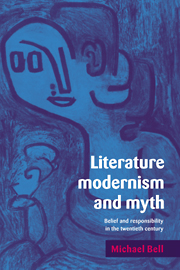Conclusion: ideology, myth and criticism
Published online by Cambridge University Press: 18 December 2009
Summary
The positive sense of ‘mythopoeia’ drawn from the practice of several modernist writers recognises the subjectivity of every world view. In affirming the necessary ‘horizon’ of the self, Nietzsche acknowledged, indeed highlighted, the measure of arbitrariness in world-making, and yet this was far from being an empty relativism such as a purely theoretical account might suggest. Every world view is inescapably an object, as well as a means, of critical judgement; whether consciously or unconsciously, and whether by disagreement or acquiescence. This truth is disguised by the fact that people absorb their native culture long before the problem, if it is one, can be brought to consciousness; and the totality of the culture never could be brought fully into consciousness anyway. Wittgenstein's ‘form of life’ and Michael Polanyi's ‘tacit dimension’ both point to this truth. To some degree, an unconscious acquiescence in one's native culture is not only inescapable, but desirable. For, even if all implicit values and commitments could be raised to critical consciousness at the same time, such a feat would be paralysing, like Funes' stupendous feat of total memory and perception in Borges' story. You can, however, be conscious of having a world view, even if you cannot be fully conscious of the world view as such, and when Nietzsche's horizon image is linked to an aesthetic model it makes this recognition emblematically self-conscious and enforces a sense of responsibility and inner attention to the dangers of dogmatism.
The aesthetic dimension is crucial. Colin Falck has argued a somewhat parallel case that literature is the modern form of myth.
- Type
- Chapter
- Information
- Literature, Modernism and MythBelief and Responsibility in the Twentieth Century, pp. 225 - 231Publisher: Cambridge University PressPrint publication year: 1997



